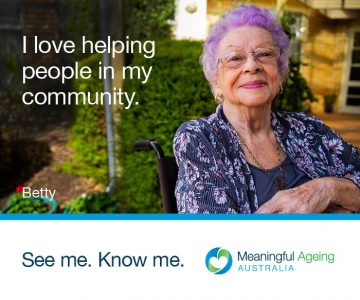See Me. Know Me.



See Me. Know Me is relevant to people who are ageing or for those who have ageing parents/ loved ones, and it offers an opportunity to strengthen connections with friends and family. It is designed to help seniors reflect on what is meaningful to them, articulate what gives them a sense of purpose and ultimately to empower them to find aged care services that will truly tune in to them as a whole person. We have free resources available to download, including posters, conversation starters, ‘purpose’ thought-starters to guide personal reflection and Top 10 questions to ask aged care providers. These resources are available in English, Simplified Chinese, Italian, Greek, Arabic, Spanish and Khmer.
Website: https://seemeknowme.org.au
Main target group: Both younger and older people (i.e. intergenerational)
Sector(s): Health, Other
Other sector(s): Aged Care
Desired outcome for older people:
Learn, grow and make decisions
Name: Hampton, Ilsa
Email address: ihampton@meaningfulage.org.au
Preferred language(s): English